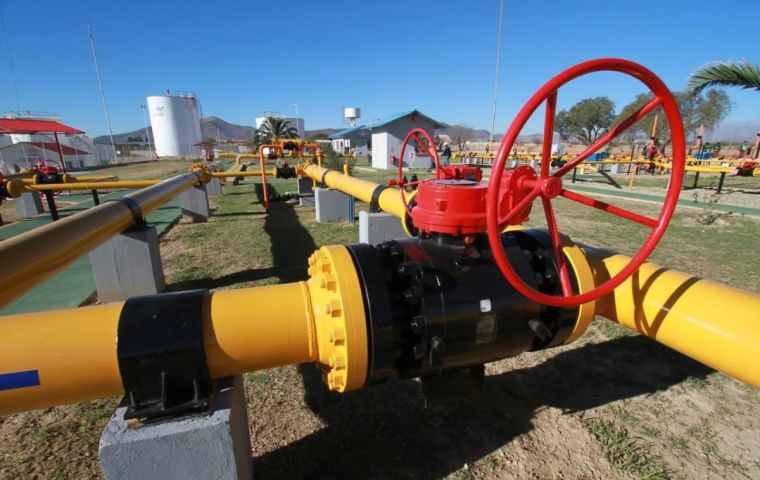MercoPress. South Atlantic News Agency
YPFB okays Argentina pumping gas to Brazil through Bolivia
 The agreement with Argentina's Total Energies and Brazil's Grupo Matrix Energía “represents a crucial step,” Dorgathen said
The agreement with Argentina's Total Energies and Brazil's Grupo Matrix Energía “represents a crucial step,” Dorgathen said Bolivia's State-run Yacimientos Petrolíferos Fiscales Bolivianos (YPFB) agreed to allow Argentina to pump gas to Brazil through the existing pipeline, company President Armin Dorgathen announced Tuesday during the International Forum on Hydrocarbons, Fertilizers, Renewable and Alternative Energies in Santa Cruz de la Sierra. “We will promote the efficient flow of gas between Argentina and Brazil, taking advantage of existing infrastructure and strengthening regional cooperation,” he said.
The agreement with Argentina's Total Energies and Brazil's Grupo Matrix Energía ”represents a crucial step to start the supply of natural gas from Vaca Muerta and the Argentine basins, through Bolivia's Integrated Transportation System (SIT), to the Brazilian consumer market, promotes the continuity of the initiatives recently announced by the companies in question and strengthens the regional energy integration process,” YPFB also mentioned in a statement.
YPFB's integrated transportation system (SIT), which includes 1,000 kilometers of pipelines and compression stations, will be the axis through which natural gas produced in Argentina's Vaca Muerta formation will be channeled to the main consumption centers in Brazil.
Argentina reached a deal to sell Vaca Muerta gas to Brazil on the sidelines of the G20 Summit in Rio de Janeiro in a move that shocked international markets given the ideological and personal differences between Presidents Luiz Inácio Lula da Silva and Javier Milei.
Pumping is due to start next year and by 2030 both parties hope to reach a volume of 30 million cubic meters per day, the same quantity that Brazil used to buy from Bolivia.
In addition to the Bolivia-Argentina gas pipeline, once built to work in the opposite direction, technicians are contemplating other alternatives, such as reaching the Brazilian State of Rio Grande do Sul via Uruguaiana, an Argentina-Paraguay-Mato Grosso do Sul connection, and also feeding Rio Grande do Sul through Uruguayan territory.
It is estimated that 70% of Brazil's energy stems from hydroelectric power plants, so generation is subject to weather variations, such as the current drought, the most severe in the past 74 years. Hence, there is a need for Argentine gas at a convenient price. According to Buenos Aires' La Nación, gas sales to Brazil could reverse the trade balance between the two countries.




Top Comments
Disclaimer & comment rules-

Read all commentsPumping knows no political ideology...
Nov 27th, 2024 - 12:47 pm 0Commenting for this story is now closed.
If you have a Facebook account, become a fan and comment on our Facebook Page!